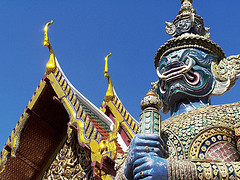Religion in Thailand
Nearly 95% of population’s religion in Thailand is Theravada Buddhism. Religious beliefs, traditions, and customs run deep, and permeate nearly every aspect of life. Folk beliefs, such as animism, as well as Chinese and Hindu religious beliefs, have become integrated into Thai religion as well, creating a belief system that is unique to Thailand.
History of Buddhism in Thailand
Some believe that Buddhism first reached Thailand during the reign of Ashoka (304–232 BC) when the famous Indian King sent Buddhist missionaries far and wide. Others believe that it wasn’t until centuries later that Buddhism was first introduced.
Whatever the exact dates were, once Buddhism reached Thailand, it quickly came to be the dominant religion. In the 13th century, during the Sukhothai Kingdom, Buddhism became Thailand’s official religion. Since then, all of Thailand’s kings, right up to present-day King Bhumibol Adulyadej, have been Buddhist.
Religious Beliefs
The core beliefs of Theravada Buddhism are based around the teachings of Guatama Buddha. Suffering, the Buddha taught, is caused by desires, craving, and the human ego. Through self-awakening and following the Eight-fold Noble Path, Theravadan Buddhists believe that a person can achieve a state of freedom from suffering and ego, called Nirvana.
Most Thais believe in reincarnation. Although enlightenment and the freedom from suffering may be achieved within a single lifetime, it’s believed that most people will take many lifetimes. Through merit-making practices such as giving donations to temples or lighting incense, people seek to improve their standing and their closeness to Nirvana in the next lifetime.
Folk beliefs, animism, and local deities all play an important part in the average Thai person’s life, as well. Many shrines, rituals, and festivals honor local deities. For example, in the Festival of Lights, many people float candles down waterways to honor the Goddess of Water.
Religious Traditions and Holy Places
Throughout Thailand, nearly 30,000 temples stand. Whether grand and elaborate, or small village complexes, these temples, called wats, are more than just places of worship. They contain libraries of religious works, are the centers for celebrations, meetings, recreational activities, education, and sometimes even serve meals.
The temples make up one cornerstone of Thai religious life. The Buddhist Sangha is another. These are the ordained monks who uphold religious traditions and learning. Most young men in Thailand are ordained as monks for a period of time. Living a monastic life, even for only a few months, is considered an important part of a young man’s life.
Life in the Sangha is strict; Theravadan Monks are not permitted to handle money, listen to music, or work. Monks can be easily recognized by their red or orange robes.
Unfortunately, in Thailand, women are not permitted to be ordained to the Sangha. Many women have, however, taken up important roles as lay practitioners of Buddhism.
The practices of lay Buddhism differ considerably from the monastic life of the Sangha. In addition to the merit-making practices of lighting candles and incense, and making donations, lay practitioners often take up important roles in the temple. Whether by handling temple finances, organizing events, or keeping the temple clean, these people play an important role in Thailand’s religious traditions.
In the past, it was not common for lay practitioners to study Buddhist scriptures or practice meditation, but this has been changing in recent years.
Other Religions in Thailand
Although the vast majority of people in Thailand are Buddhist, religious tolerance and freedom are an important part of the Thai mindset. Other religious groups are treated with kindness and open-mindedness, and they make up an important part of Thailand’s population.
About 4% of the population is Muslim. Another 0.5% of the population is Christian. There are also small Hindu and Sikh minorities, mostly located in Bangkok.


